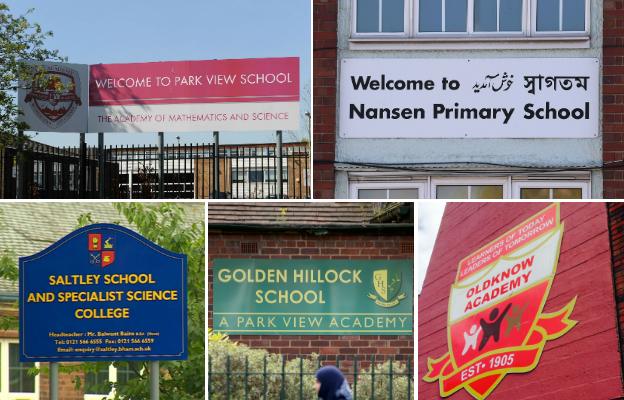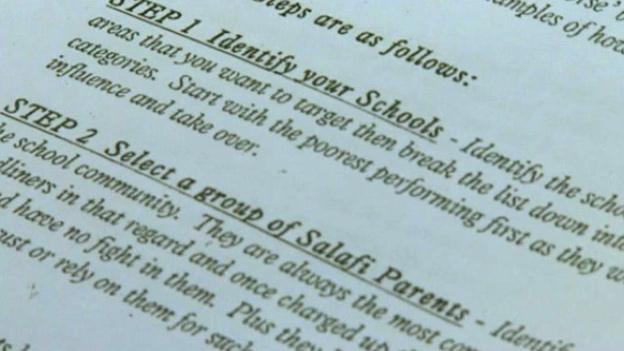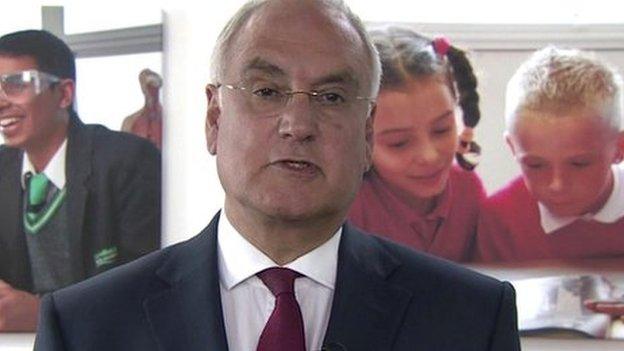Trojan Horse: What have we learnt?
- Published
- comments

Some members of the Islamic community believe the 'Trojan Horse' allegations are a hoax....
"What on earth is going on in Birmingham?" asked one of my BBC Westminster colleagues on my first visit to SW1 after the Whit Recess.
I suggested Birmingham, one of the most diverse and youngest cities in Europe, "the Britain of tomorrow", may simply be experiencing the leading edge of an issue which is not unique to this city and could well be played out elsewhere.
In order to deal with it, we are all having to learn a new vocabulary:
1. 'Extremism': Politicians and journalists bandy the word about but do we really understand what we mean by it, especially when the Education Secretary Michael Gove develops the idea of 'Non-terrorist Extremism', as if there are two parallel fundamentalist conspiracies, one violent and the other, surreptitious, stealthy?
2. 'Islamification' My spell-checker tells me there is no such thing. But it is implicit to the findings of this week's Ofsted report on 21 Birmingham schools and to the government's response to it; in effect taking over the running of five of them by placing them under special measures.
But opinions within the Islamic community are fiercely divided. Some, like the former Respect city councillor Salma Yaqoob, say Ofsted's report is politically-motivated. Her "Hands off Birmingham's Schools" campaign urges the government to listen instead to local communities. They point out the allegations contained in the so-called "Trojan Horse" letter have never been proved. Not so much a Trojan Horse as a Trojan Hoax, they believe.

...others think fundamentalists have targeted inner city schools in Birmingham
But others, like the Labour MP for Birmingham Perry Barr Khalid Mahmood say Islamic fundamentalists have indeed been targeting inner city schools in order to indoctrinate the children
3. 'Academisation'. This word also fails the spell-checker test. By opting for academy status, one of Michael Gove's flagship policies, schools at the centre of these allegations have broadly removed themselves from council control. Critics, including Professor Jonathan Tritter, Professor of Sociology and Public Policy at Aston University, warn this weakens the democratic leverage once enjoyed by local education authorities as democratic guarantors of the wider public interest.
4. 'Britishness'. The word has only recently come into frequent usage as the politicians' recommended antidote to separateness and social exclusion. The pity of it is that Birmingham has much to celebrate in the way large areas of the city have evolved a new form of Britishness.
On Sunday, I attended a dinner hosted by the Bangladeshi business community where one of the speakers told us how much she enjoyed introducing her African-Caribbean friends to the delights of South Asian cuisine and music, and then heading-off herself to Soho Road for an evening of Jamaican cooking and Reggae.
Another of the guests of honour was the newly-appointed UK Ambassador to Peru, Anwar Chaudhury. His powerful message was that we are all "Brits" together. Not Bangladeshi "Brits", not African-Caribbean or Chinese "Brits". Just "Brits".
I suggested to one Bangladeshi business leader running a firm with an annual turnover of £40m, that in communities with more than 90% Muslim populations it was almost axiomatic most school governors would themselves be of the Islamic faith.
He agreed, but for him the crucial point came when a line was crossed which took a school away from the natural consequences of living in an area with a preponderant faith group into something different altogether: separate and removed from the fairness, tolerance and "small l" liberalism traditionally associated with, yes, "Britishness".

Ofsted chief Sir Michael Wilshaw says there is cause for "grave concern" in Birmingham
His suggestion was possibly for groups of schools serving a variety of ethnic communities to band together and so dilute the influence of any one grouping. Six schools have formed a co-operative trust in the north of the city, including one in Sutton Coldfield. The Perry Beeches Academy Trust, led by one of the government's "superheads" Liam Nolan describes itself as "a family of two secondary schools". Families do have a habit of growing don't they?
Conversely, is it right that a city with 250,000 Muslims should have no more than its present one Islamic faith school? The Labour MP for Birmingham Hodge Hill, Liam Byrne had floated the idea that parents at Park View Academy in his constituency could be consulted over converting to an Islamic faith school.
Ministers have often spoken approvingly of the part played in Britain's faith schools. This could be an important test of just how inclusive their own concept of "Britishness" really is.
These are some of the themes I will be taking up on this week's Sunday Politics Midlands with our guests: Mark Pritchard MP (Con) The Wrekin, who was educated at, among other places, the Regents Theological College in Malvern; and the aforementioned Khalid Mahmood MP (Lab) Birmingham Perry Barr and Salma Yaqoob from the "Hands off Birmingham Schools Campaign".
And I hope you will join us too, at the usual time of 11:00 on BBC One in the Midlands on Sunday.
And so to our final new word, which is actually an ancient classical one:
5. 'Trojan'
As in '"Trojan Horse". Classicists among you will need no reminding of this tale from the Trojan War. Having besieged the city of Troy unavailingly for 10 years, the Greeks built an enormous wooden horse which they filled with elite soldiers. They parked it outside the city gates then sailed away to lull the Trojans into a false sense of security.
Seeing the horse as a victory trophy, the Trojans pulled it in through the city gates. Under cover of darkness the Greek soldiers crept out of the horse and reopened the gates to the rest of their compatriots who had sailed back in.
The Greeks destroyed the city and brought the war to a decisive conclusion. No wonder "Trojan" has become a metaphor for any trick which cons the victim into allowing its enemy into its most secure bastion, such as "Trojan" computer programmes which are willingly run on the very computers they are attacking.
But who is really conning whom, was it a Trojan Horse or a Trojan Hoax?